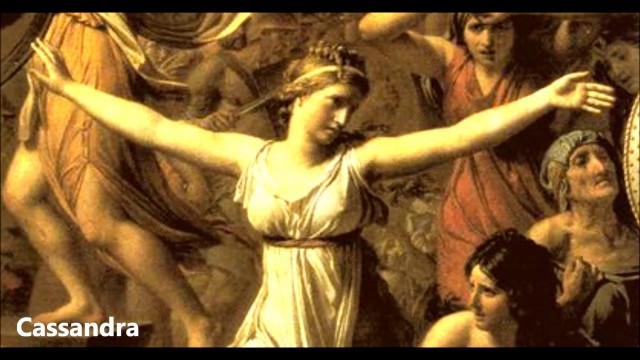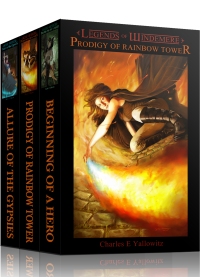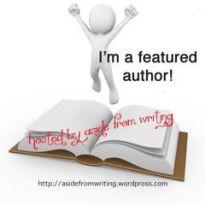
Cassandra
I’ve touched on a lot of characters from War of Nytefall, but I haven’t really talked a lot about Stephanie Talon. I gave her a post to explain her origin a little over a year ago and haven’t gone back. One of the reasons is because I’ve touched on psychics and various types of fortune telling styles before. She doesn’t really fall perfectly into those categories, but there’s enough overlapping to make it previous territory. That doesn’t mean I can’t talk a little about the role.
Fiction, especially fantasy, has a long history of characters who can see the future or scry on distant events. Stephanie can do both, but usually focus on the latter by using her blood scrying powers. These characters can be central and tragic like with Cassandra in mythology or supporting cast like The Oracle in ‘The Matrix’. Others can turn into villains because of their powers, which many demonstrate to be hard to control. There is a trend of one being able to see the future causing insanity. Still, you most commonly find a seer as a stopping point during a quest in order to continue on.
When writing, having a character who can tell the future may seem like a great idea. In the planning stages, you can see this as a way to create foreshadowing. Everybody loves those quirky hints about what’s to come. Unfortunately, this has a high chance of backfiring because it lacks the subtlety of regular foreshadowing. People know the character is talking about events that are about to happen, so you could easily eliminate the story’s tension. There are ways around it such as having the visions be vague or working with riddles. Yet, you can end up being too vague or run into readers who find your riddles to be fairly easy. So, this is a character type that you have to use very sparingly.
That risk is a big reason why Stephanie Talon is called a ritualist in the books instead of a seer or oracle. Although, I may have called her a seer a few times. I have it noted that she can see into the future, but I don’t like having her do it. Solely because of that risk and I always wonder if she would be asked to do so. Xavier Tempest can be a little paranoid and he’s intelligent. He strikes me as a person who would consider the possibility that knowing his future might change it. For example, he could be told that he is going to kill Clyde, so he goes in cocky and gets his head torn off. Pretty sure the guy has had nightmares about that, so this one aspect of Stephanie’s powers isn’t depended on in the stories themselves. Guess you can see how almost any oracle can become a Cassandra if a person is cynical or cautious.
So, what do people think about using these kinds of characters in fiction? Is it something you’ve done before or considered? Are they a role that should be eliminated from genres entirely?





In my opinion, if used correctly, they can make for great additions to the cast of characters.
LikeLiked by 1 person
True. They are tricky though.
LikeLike
I have no skill in this area and admire the fact that you do. Good post, Charles,
LikeLiked by 1 person
Thanks. 😁
LikeLiked by 1 person
You have such a great variety of posts! Stephanie’s character is interesting. Was she fun to write?
I can’t help thinking of the Percy Jackson series. and the Oracle of Delphi. Prophecies in the series were given by the Oracle.
I use seers for a specific purpose–like a guide with a word of knowledge. (“So and so will help you on your journey–that sort of thing.”)
LikeLike
Stephanie was fun to write, but she took time to get there. Oracle of Delphi is definitely a popular one. I haven’t tried anything like that yet. Stephanie is more of a royal seer that is called in for specific reasons.
LikeLike
A royal seer. Ooo. Love that.
LikeLike
Poor Cassandra was cursed to utter prophecies that were true but that no one believed.
I think there was also another Ancient Greek prophet who couldn’t remember his/her prophetic visions, or, could only remember disjointed bits that didn’t make sense until after the events occurred.
LikeLike
I think Medea is another seer. They definitely come up a lot in mythology.
LikeLiked by 1 person
I think they’re useful characters. The challenge is not to give the plot away. Anything they deliver should be more like a riddle. Think of looking for Mary Celeste, but learning that was the name of a ship. Once at the ship, they’ve exceeded the limits of the prophecy and have to forge ahead anyway.
LikeLike
That’s where riddles and vagueness come in.
LikeLiked by 1 person
I usually think of future prediction as more of a headache, as you have to make the end result fit the foretelling. Maybe literally, maybe with some kind of twist. Anyway, I usually forget the forecast and then during revisions I have the D’oh! moment.
But in my most recent novella, The Tower in the Mist (which you so kindly featured a week or two ago) there is one of the mage characters who has visions of the future. He has learned to trust his visions, and plans his future activity accordingly. In the follow-up, a different mage has strong intuition, and again she has learned to trust it and react to what she senses. But their visions and/or hunches are always incomplete, so there is suspense for the characters and the readers about what these really mean.
LikeLike
Visions do require some planning. I’ve read a few stories and watched some shows where a prophecy is forgotten. It can derail the whole thing.
LikeLiked by 1 person